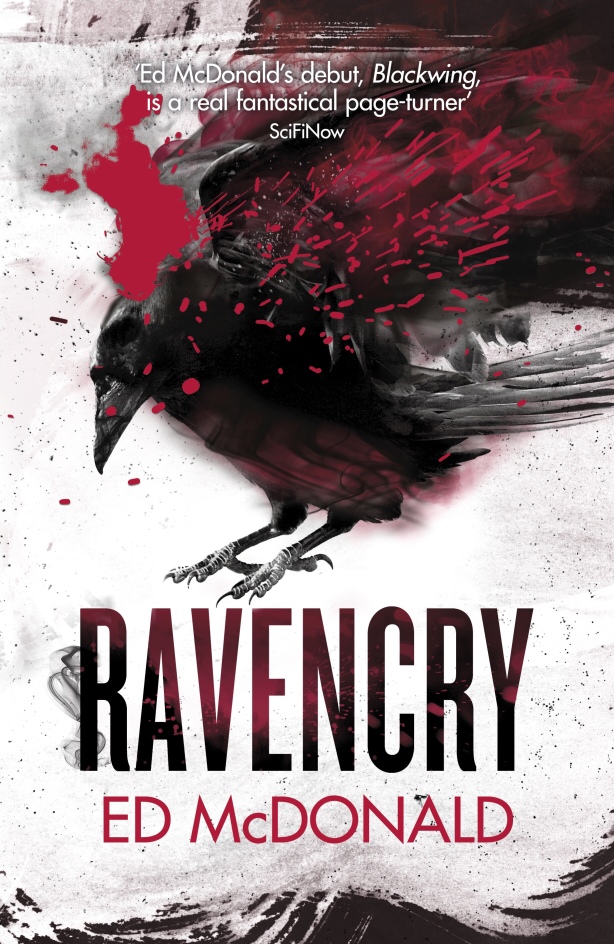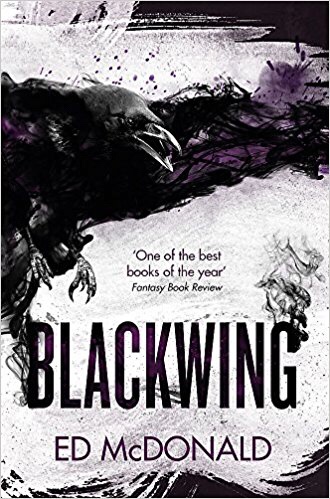Author of the exceptional debut Blackwing and the soon to be available Ravencry, Ed McDonald has been kind enough to write a guest blog. It’s an interesting insight into his creative process and well worth a read.

So where do you get your ideas?
If you want to raise a wry smile among a group of writers, this is the question that will do it. It’s a highly complicated question, and the truth is that often, we have no idea ourselves. For some novelists there may be a single theme or idea that inspired the writing of a book, such as an experience in childhood, but for me that’s not the case. In this wonderfully hosted guest blog, I thought that I’d showcase how certain elements of Blackwing and Ravencry came about, and the kind of insight they might give into my own rather chaotic, haphazard writing ‘process.’ Although I’ve said before that there’s as much conscious ‘process’ in what I do as there is to throwing a bunch of alphabetti spaghetti on a plate and expecting words.
There are a number of places that ideas come from. Some emerge at random, some are long held passions, and some are engineered for plot reasons. For those that consider themselves writing ‘Gardeners’ then some of these things may seem familiar.
I don’t really know where Galharrow came from.
Galharrow was never an idea. He never existed in the sense that I sat down and tried to choose character traits for him. Everything that he is, from the narrative voice he tells the story in to the actions he takes, to his appearance, was either pre-formed in my mind, or developed subconsciously without any active thought. I wanted him to be 6’6 and weigh 300lbs because I knew he’d have a lot of action to get into, and physical prowess was going to help him out. His size also allows him to carry other people around, which is really handy. But the alcoholism, his lack of sympathy, and his ultimate nobility and heart were just kind of. . . there. His backstory emerged mid-page as I was writing.
Nenn was an accident
Nenn was never a conscious decision. In Draft 1, there was a character called Shent, who was supposed to be Galharrow’s right hand man, but he split into Tnota and Nenn. Nenn was a throwaway, one-line character, whose missing nose was mentioned purely as a fun detail to show that Galharrow’s company were scarred and war-weary, but as soon as I’d written her first expletive filled line, I immediately knew who she was and how she acted. I didn’t expect Nenn to become a fan favourite, or one of my own, and at times she ends up stealing the show. She became the counterpoint to Galharrow’s regretful, grumpy, calculating, brooding exterior; Nenn is reckless, savage, always wearing a grin and is defined by how little she cares about other people’s opinions – or at least that’s what she wants to present. In Ravencry we see beneath that surface. I really love how she evolved through the pages.
But you did worldbuilding for the Misery, right?
Alas, no. In fact, I don’t do any worldbuilding in the sense that people would normally mean – there is no heaving file of notes. I prefer to create details as I go along. For the Misery, I needed there to be a wasteland that divided two kingdoms at war. I also needed a reason that the larger, more powerful kingdom wasn’t simply marching over to claim victory, and the Engine (early names for Nall’s Engine were The Lightning Web and The Storm Wall) was created to provide the stalemate. Once I knew what Nall’s Engine was, it made sense that it would leave some bad magic in its wake. As it happens, that bit of story crafting then became the key plot element in both RAVENCRY and the book that will follow it.
So nothing is inspired or deliberately plotted?
No, not so. Sometimes I need something for a plot reason, or sometimes I just want to write it. My grandmother told me her stories of life during The Blitz in the second world war. She lived in Coventry, a major manufacturing centre in the UK, and as a young woman she had to endure the nightly bombing raids. Some of her stories were too inspiring not to write them into RAVENCRY. I don’t think that you can really capture the terror of such a time, but I hope that I’ve done some justice to expressing the helplessness felt by the innocent during periods of industrialised war.
The trick of writing a book is to get all this randomness to work as a cohesive whole – thank goodness for editors. I’ll finish by leaving a piece of advice for any budding writers who might be reading:
If you are like me – and you probably aren’t – and if you find that you’re not sure where to start, then just start writing. Trust that your subconscious, silent mind: it probably has much better ideas than anything that your vocal inner monologue is going to push out. Let those ideas flow, and if they aren’t flowing, go and look at the world, go sit somewhere else, take a walk, and then just start writing. I’m seldom aware of my own ideas until after I’ve written them.


